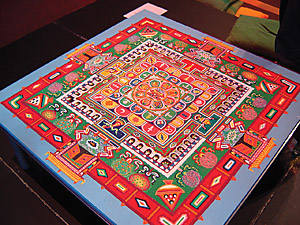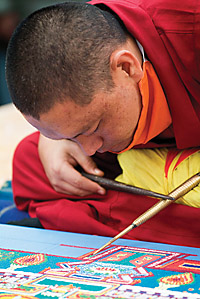 | A completed sand mandala by Namgyal monks. |
The exiled Namgyal monks from His Holiness the Dalai Lama’s private
monastery in Dharamsala, India, are bringing their artistic and musical talents
to Yale’s Peabody Museum of Natural History during the last week of September.
T H I S
Art, music of Tibetan monks
to be featured in campus events
Sand mandala ritual
The monks will create a sand mandala, a unique tradition of Tibetan Buddhism
that involves the ritual of painting with sand, Wednesday-Saturday, Sept. 25-29.
The mandala (“circle” in Sanskrit) is designed as a tool for gaining
wisdom and compassion, and is generally depicted as a tightly balanced, geometric
composition. Sand mandalas are believed to transmit their positive energies
to the environment and to those who view them.
The monks begin construction of a mandala by consecrating the site with sacred
chants and music. Next, they make a detailed drawing from memory. Over the
next days, they fill in the design with millions of grains of colored sand
while chanting and meditating to invoke the divine energies of the deities
residing within the mandala.
Once the mandala is completed and consecrated, the monks underscore the impermanent
nature of existence by sweeping up the colored grains and dispersing them,
an expression of sharing the mandala’s blessing with all.
The Sand Mandala Dissolution Ceremony at the Peabody Museum will take place
on Sept. 29 at 3 p.m.

A monk working on one of the sand paintings.
Sand mandala workshop
Earlier that day, at 12:15 p.m., the monks will hold a Sand Mandala Workshop.
Participants will be invited to experience the beauty and difficulty of this
art form by using the chak-phur to create designs with the colored sand. The
workshop is $8 for museum members; $10 for non-members. Those interested can
pre-register at (203) 432-6646 or peabody.events@yale.edu.
In concert with Tenzin Choegyal
The monks will team their harmonic chanting with the voice of Tibetan musician
Tenzin Choegyal in a free concert at 7:30 p.m. on Sept. 28 in the Levinson
Auditorium, Yale Law School, 127 Wall St. The concert is sponsored by a grant
from the Rubin Foundation.
Tenzin accompanies his vocals with traditional instruments such as the Dranyen
(long-necked lute) and Lingbu (transverse bamboo flute), of which he is a master.
His music, however, challenges Tibetan norms and is distinctly modern.
The Peabody Museum of Natural History is located at 170 Whitney Ave. It is
open Monday-Saturday, 9 a.m.-5 p.m., and Sunday, noon-5 p.m. Unless otherwise
noted, admission to exhibits and programs is free with admission, which ranges
from $7 to $5. Admission is free for museum members, children under age 3 and
Yale community members with valid I.D. The museum is free to all on Thursdays,
2-5 p.m. Visit www.peabody.yale.edu for additional information.  W E E K ' S
W E E K ' S S T O R I E S
S T O R I E S![]()
 Yale, Peru forge ‘model’ collaboration on Machu Picchu
Yale, Peru forge ‘model’ collaboration on Machu Picchu![]()
![]()
 Foster + Partners to design new SOM building
Foster + Partners to design new SOM building![]()
![]()
 NIH grant aims to speed development of alcoholism treatment
NIH grant aims to speed development of alcoholism treatment![]()
![]()
 ‘Quiet on the set!’: Scenes for DeNiro-Pacino movie shot in employee’s home
‘Quiet on the set!’: Scenes for DeNiro-Pacino movie shot in employee’s home![]()
![]()
 ENDOWED PROFESSORSHIPS
ENDOWED PROFESSORSHIPS
 Anderson comes to Yale as Lanman Professor
Anderson comes to Yale as Lanman Professor![]()
 Harries appointed as first Ragen Professor
Harries appointed as first Ragen Professor![]()
 Nägele is first incumbent of Mohr Professorship
Nägele is first incumbent of Mohr Professorship![]()
 Smith has been named to Wells Professorship
Smith has been named to Wells Professorship![]()
![]()
 Scholars named to joint posts at MacMillan Center
Scholars named to joint posts at MacMillan Center![]()
![]()
 Abigail Rider to manage Yale’s real estate
Abigail Rider to manage Yale’s real estate![]()
![]()
 Exhibit chronicles slavery and emancipation in Jamaica
Exhibit chronicles slavery and emancipation in Jamaica![]()
![]()
 Activist and author Gloria Steinem to visit as Chubb Fellow
Activist and author Gloria Steinem to visit as Chubb Fellow![]()
![]()
 Art, music of Tibetan monks to be featured in campus events
Art, music of Tibetan monks to be featured in campus events![]()
![]()
 Architect-designed housewares produced by Swid Powell . . .
Architect-designed housewares produced by Swid Powell . . .![]()
![]()
 Award-winning play about conjoined twins to be presented
Award-winning play about conjoined twins to be presented![]()
![]()
 Brownell: Food addiction and nutrition
Brownell: Food addiction and nutrition![]()
![]()
 Part one of two-part conference will explore ‘Frontier Cities’
Part one of two-part conference will explore ‘Frontier Cities’![]()
![]()
 Tribute to Cleanth Brooks examines the topic ‘What is Close Reading?’
Tribute to Cleanth Brooks examines the topic ‘What is Close Reading?’![]()
![]()
 Show features paintings of city scenes by Constance LaPalombara
Show features paintings of city scenes by Constance LaPalombara![]()
![]()
 Getting saucy
Getting saucy![]()
![]()
 Look at ‘Past Year in Admissions’ . . .
Look at ‘Past Year in Admissions’ . . .![]()
![]()
 Campus Notes
Campus Notes![]()
Bulletin Home |
| Visiting on Campus
Visiting on Campus |
| Calendar of Events
Calendar of Events |
| In the News
In the News![]()
Bulletin Board |
| Classified Ads
Classified Ads |
| Search Archives
Search Archives |
| Deadlines
Deadlines![]()
Bulletin Staff |
| Public Affairs
Public Affairs |
| News Releases
News Releases |
| E-Mail Us
E-Mail Us |
| Yale Home
Yale Home